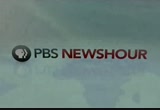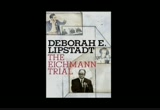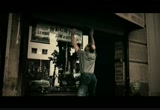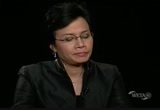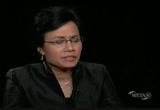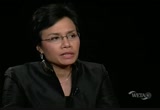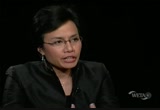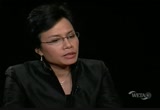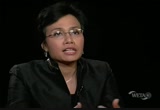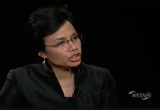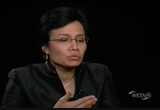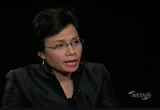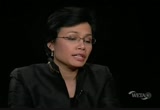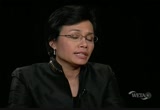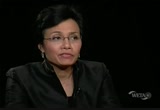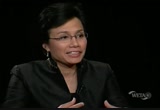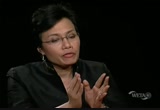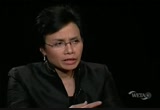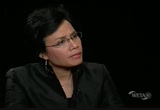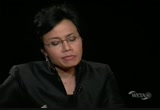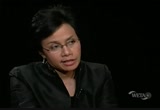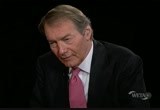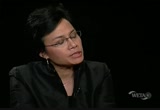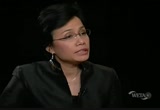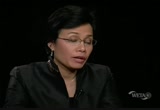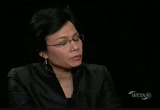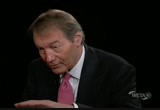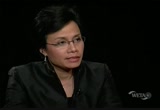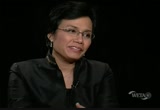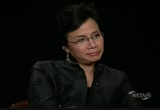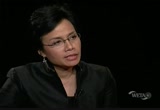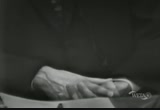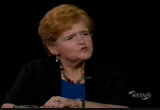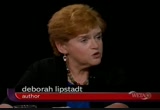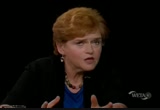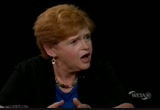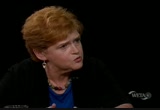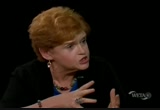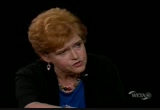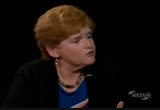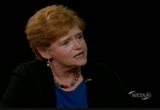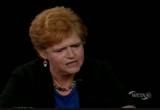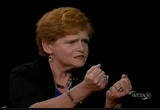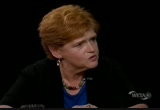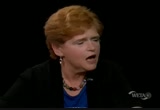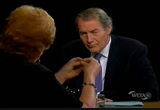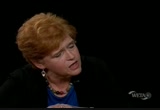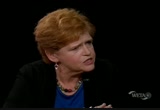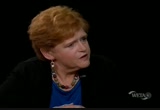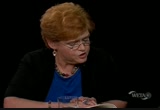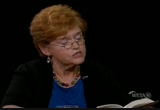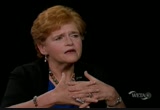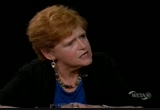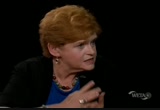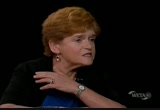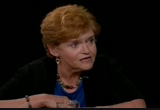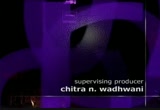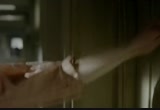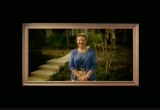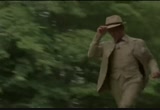tv Charlie Rose PBS July 6, 2011 12:00am-1:00am EDT
12:00 am
>> rose: welco to you are a program. begin this evening with a conversation with former finance manager in indonesia and now managing director of the world bank sri mulyani indrawati. >> the country was already achieved their successful development process from low income to become a middle-income country but it doesn't guarantee them to become a high income country. a lot of countries in the middle income they then stay there. so we call it the middle income track. and that is the area that the bank can provide with quite a lot of experience because we are a knowledge bank. we are not just lending money. >> rose: we continue with deborah lipstad, the author of "the eichmann trial." you'll see when mlac is tried
12:01 am
in the hague there will be survivors there telling their story. when milosevic was tried, there were survivors telling their story. you wouldn't think of having genocide trial now, a mass murder trial, without the voice of the survivor. that's the legacy of the eichmann trial. it wasn't that the survivors hadn't spoken before. they had spoken before. but the world hadn'tistened. >> rose: sri mulyani indrawati and deborah lipstad when continue. funding for charlie rose was provided by the following: every story needs a hero we can all root for. who beats the odds and comes out on top. but this isn't just a hollywood storyline. it's happeninevery day, all across america. every time a storefront opens. or the midnight oil is burned. or when someone chases a dream, not just a dollar.
12:02 am
they are small business owners. so if you wanna root for a real hero, supporsmall business. shop small. additional funding provided by these funders: captioning sponsored by rose communications from our studios in new york city, this is charlie rose. rose: sri mulyani indrawati is here. she is one ofñr the managing directors of the world bank. she oversees operations in latin america and the caribbean, east asia and the pacific and the middle east and north africa. prior to joining the bank in
12:03 am
2010 she was a finance mister of indonesia. she was praised for her efforts to implement economic reform, tackle corruption and increase the tax base. indonesia is today one of the fastest-growing economies in the world. i ver pleased to have her here at this table to ta not only about the world bank but also about emerging nations an about indonesia. welcome. >> thank you, charlie. >> rose: are you going to go go back to indonesia and run for president? >> well, that is a very frequent question. >> rose: yes? >> i am now managing director of the bank which oversees more than 70 countries across a very die unanimously i can region. so i think i enjoy the job now. people may have an expectation and i feel honored they think i can contribute good things to indonesia. >> rose: assess for me where indonesia is today. >> well, indonesia, the size of the economy is... within the jooet i think we are 16th
12:04 am
ranked. we are may the last exposed in the news and media and less understood by many people. why because i think indonesia is not that articulate in telling about themselves. althou we are a very fascinating country if youook at a bigcountry with more than 220 million people, a big muslim country, democratic whave a lot of achievement in the past in rucingositive a that was achievement during 40 years. but then we learn a lot that it is not only enough to have a high growth reducing poverty people need to have transparency participation, accountability and good governance. and that's become the lesson learned. we have to pay 75% of our g.d.p.
12:05 am
because of the banking system to bail out the crisis. so a lot of lessons learned from indonesia. as a country that is so diverse but a lot ofñi achievemt. a lot of development lessons can be learned from this country. >> many people when they look at the arab spring they say where's thmodel? some say turkey, others say indonesia. because of the way you handle-- you meaning the indonesians-- after the overthrow of suharto. >> yes. well it is... i mean, you talk indonesia after 12 years of this transition, ve painful transition in '97/'98. that experience, changinfrom centralized to decentralized, from closed society to open, from veryuthoritarian to depthic, for a country st like
12:06 am
indonesia, even people said indonesia was going to be split into small countries. so it was not an easy time for us but we adopted a lot of what we called a front-loaded reform during this very critical part in order to make sure that we are going to change the past. we are really abandoning the previous or past practices. we established a verystrong anti-corruption law and even appointing and establishing a corruption commission. we're very proud of it. it was a very strong ambitio change on the governance, especially related to state finance if you call in the egypt now when... or tunisia they're asking about how you govern the state finance from the management disclosure up to the securing it and using it for the people.
12:07 am
and a lot of what do you call it ambitious reform that cannot be achieved. the expectation of people is very high dung this transition pecially after 30earsof very old regime. ey want to have a change now, fast. so sometimes that can be predicted or need to be managed by the transition government and the most important is actually the interest group that can capture and hijack during that process. >> rose: what kind of interest group? >> many things, if you look at the indonesians on the political side, the whether indonesia has become t open, secular, democratic country or you are becoming more a majority of muslim that you have to adopt and put this islamic law within the practice of the indonesian... within the economy. people will talk and debate about anti-foreign investments whether more or nationalist and
12:08 am
then discussing about the rule of state in this case because we have more than 100 crises. th kind of debate is now also happeninin many cntes. i mean, the nationalistic populist sentiment of policy vis-vis more like open competition. >> rose: how do you think indonesia handled the issue of tolerance with respect to this majority islamic population? the largest islamic nation in the world. >> constitutnally it has bee debated when we... our founding father in this ca decided to have this... the ening or pre-amble of the constitution. we just already agreedhat would become the national commitment, a soci contract if you can call it that that we are going to abide and respecting
12:09 am
all belief iss indonesian. so it's not really explicitly even mentioning about islam. so in the way... the founding father at that time was also facing this debate whether we should put sharia or we are becoming just secular and respecting all the beliefs. i think the nuance as well as for indonesia and specifically because you have become open democratic, meaning that everybody thks they can express. but for indonesia during this transition one thing that we still need is the rule of law and respecting the law because democracy results in the rule of law and that's anarchy or become the majority that can suppress to the minority. and that is the critical time. i think many of the feworries
12:10 am
w is whether indonesia is going to repete the episode of debating that again. but if you follow closely, i think the majority of the people feel that what we have built in the past or decided by our founding fher was the right one. >> rose: and you agree with that. >> oh, yes, of course. >> rose: and what's e threat that it will be changed? >> wellñr, many countries in the world i think the interest groups have all the ability to influence whether this is onñi e policy level or up to the decision that will affect or benefit them. you can see in the a political as well as an economic interest group in this case. so with this democratic system they are now trying to get those influences through the system, through the democratic system. they establish law... they establish political parties, they have the program or ideology, they offer it to the
12:11 am
people and the indonesian people i think through the cycle of elections that we have, twice at least since the transition, we make a choice. and if you see the choice of the indonesian people most of them is the moderate secular party, national interest is more rather than sectarian oreligious. >> rose: this is the president's party. >> well, not only the president's party. i think there are otherwo or three parties based on the natial and secular rather than th religis or sectarian base. and i think tt has actually become the meck name will guarantee the checks and balance between interest groups. >> rose: ands where the corruption battle? >> well, corruption is always an enemy of development both in developed and developing countries. and for... >> rose: because there's so much money to be snead >> oh, yeah, of course. the perception in the past has
12:12 am
been said that indonesia from the public side is always 30% (inaudible) well then we estimate that $20 to $40 billion of developing countries actually the costs from this corruption. it is about the public trust. it is about the effectiveness of the government. it is about rule of law so it's the ability to enforce this law that is very portant and for indosia it's very difficult. this is not unique for indonesia. i can't illustrate to you that this actually happens in many countries. when we aren't dealing with a lot of interest groups then they can easily actually capture the country from bothñi policy level up to even manipulating the minister of defense and this is the area which we need toñi improve the governance, the
12:13 am
bureaucracy. and that is the struggle that we in the developing country they are now facing. >> rose: i want to move to the world bank where you are now. what's your greatest challenge there? >> from my previous job i certainly have a lot of experience and lessons. the development is not a one simple issue. and that's bringing now in the bang. i bring the perspective of the client count trees the bank as an institution who tes to eradicate poverty and working with and through the government. and understanding and with my own experience understand the complexity of any government. whether you are a authoritarian government or democratic then you understand how far as an institution you can influence. and i think the blank learn a lot. i think from the development perspective we accumulate a lot of lessons oselves and by the way on june 25, the ba is going to be 65 years now.
12:14 am
and i mean during the 65 years we accumulate a lot of knowledge and lessons. >> rose: has the focus of t world bank changed, do you think? an evolution in its focus? >> from time to time i think it's always changed. in the past it was always heavy on the infrastructure projects and then they move to more like soft social sectors, for example like education then we move on to big issues like macroeconomic policy, governance, anti-corruption. so we will see that now we are facing food security, fuel price. >> rose: food scarcity? >> food scarcity and that's become a threat of development. >> rose: what's the issue? >> well, the population is going to reach the nine billion by 2015. the land is still fixed. >> rose: right. more people but not more land.
12:15 am
exactly. and most importantly also, many countries now become a middle-income status. that means demand for food is not only about quantity but quality. and that creates a lot of pressure, not to mention that the demands of many of these middle-income countries-- china, a lot of emerging countries in latin america, middle east, southsia-- they are very strong growing demand for energy and you mentioned about this treoff between food and fuel. >> rose: right. >> so allthis is giving us a very predictable situation in whh the demand is going to be always strong. where the ability to respond from the supply-side needs to be addressed. >> rose: why is the world bank the right place to address it? >> well, definitelyot only world bank. we work together with the g-20 in which the bank with the g-20
12:16 am
government put food first and that's addressinthe issue on a supply constraint,roductivity, technology, fertilizer and all those things, whether this is related to the connectivity. because you can't have the (inaudible) but they are not connected with the demand side. especially if you tack about humanitarian. it's also subject to the export so the policy on trade can really addup to this speculation. >> rose: where do you think food scarcity is on the agenda for the g-20? >> well, they are now. i think we just had the meeting of the agriculture minister of the g-20. don't forget that the g-20 originally discussed... i was finance minister. that's more about discussions about the finance macroeconomic policy in this case, and especially whewe have the crisis in 2008. since then i think g-20 has been
12:17 am
including quite a lot of very pressing development issues. >> rose: what do you think should be done about food scarcity? >> well, first i think in this case... not only scarcity but improvement on the supply-side that is productivity technology. second is reducing the speculation through a more transparent information and that's what the bank now supports. in this case by providing the information about where, how much food has been produced, how much the demand. so there is no speculation about that. third is relating to the hedging of the risks. many of the farmers are the most forbable ones. they produce food but they cannot actually earn and enjoy the surplus of theñi price itse. so there's quite a lot of hedging mechanism in the which the bank is just launching the $4 billion and hedging for the developing country in order for them to manage this risk. >> rose: can they stabilize food
12:18 am
pric? >> well,eally stabilizing is definitely something which is very important. it will provide with a much betterrotection for the poor because the poor people are the one (inaudible). the stability can only be achieved if you know actly where... how much actually supply and the demand. so there is no element of guessi or speculating and that is exactly what we tried to do with the g-20overnments. >> rose: water scarcity. is that a huge problem? >> that's become a huge problem. you talk about middle east, i think this is also linked to the life-style and the trend of organization. more and more countries now has been comforting their econy which is mainly driven by the urban activity.
12:19 am
the population, talk about china china is going to naudible) so water scarcity, water has become one of the resources which is going to be very, veró valuable and becoming very scarce. >> rose: what do you need most in order thave the maximum impact that you would like snof. >> my jurisdiction in this case is... especially consists of many middle income countries. >> rose: right. >> it's the country who's already achievedheir successfulevelopment process from low income to become a middle income. but it doesn'tuarantee them to become a high-income and hedge fund country. a lot of country in the middle income they then stay there. so we call it the middle income track. >> rose: right. >> and that is the area in which thbankan pvide th quite a lot of experience because we are a knowledge bank. we are not just lendin money.
12:20 am
we actually provide with knowledge, thys, learning from other countries. ... technical assistance. this is the area becoming the most important. but the bank is also dealing with a lot of conflict states. in this case we just issued this year on our world development in port in how we will be the most useful in supporting the country facing conflict and fragility. >> rose: you're also looking far new president for the world bank, are you not? >> yes. that's going to be next year. >> rose: are you a candidate for that? >> well, the shareholder has already made decisions in this case and i think this happened to the i.m.f. in the which the composition of the shareholder of the bank as well as the i.m.f. is now reflecting more and bhar you call it the emerging countries voice. >> rose: an american will become
12:21 am
president of t world bank and a non-american for... yes. >> rose: subpoena that changing? >> well, the shareholders made decisions that we are now actually trying to establish the mechanisms in which the (inaudible) is based on the merits. >> rose: on merit ratherhan. >> nationality. >> rose: an american could become president of the... >> managing director? and you could become president of the world bank? >> (laughs) >> rose: those kinds of things. >> it's really up to the shareholder whether they are going to abide with this. >> ros but it sounds like a good idea. you agree with changing the principle, do you not? >> well, it's not only that i need to agree or not i think for the sake of the bank and the i.m.f. to be effective and legitimate they have to be. you have to be acceptable and legitimate in front of all your member countries. and i think the governance is the most important element of this legislation.
12:22 am
>> rose:ack to global issues. are we losing the battle in the gap between the wealthy and the poor? >> many of the middle income countries are growing so fast and they recover even from the crisis of 2008 that it don't guarantee that they can provide with a share of prosperity in an equal w and you talk about the common concern. are we losing a battle or not? i don't think so. there are quite a lot of programs but then tlls also a setback which is sometimes dictated or driven by external factors. you just mentioned food. becae of thisfoodrisis, 44 million now has been back to the verty again. >>ñi rose: 44 million people. >> 44 million since last year only. if you talk about one year in which 44 million. if you tack about food availability, one billion people is still living hungry.
12:23 am
>> rose: a billion people in the world live in hunger? >> yeah. >> rose: a billion people? one-sixth of the world's population? >> one-sixth of the world's population. yes. it's a battle for us. and i think for any countr.. in the past maybe it's been seen as just the responsibily of many developed countries so that's why you have... you have the o.d.a. and so on. but now many emergi an developing countries have an equal responsibility to deal with this poverty issue, with the hunger, with the food problem. and this has been the challenge of defing and building the new multilateralism because you are now connected in an interconnected world. that is globalized world. it's not only that you say that any problem has become a sovereign problem, even if you talk about the global financial crisis now the lehman case here
12:24 am
affecting when i was in indonesia, the economies have almost collapsed because of what happened here. so we need to work even closer and the corporation needs to be rebuilt and redefined. >> rose: does e attitude towards the united states financl leadership change because of the subprime crisis and the economic collapse? >> well, definitely what is happening now in europe and united states is happening to the reality that even the most advanced country, if you're not managing and adopting appropriate prudent policy you're going to end up with the same thing like what is happening in many emerging developing countries. so you talk about... >> rose: end up with having too much debt you can't pay. >> too much debt and then you have to take a very painful adjustment in order for you to then sustainable again and recover in a more equible way.
12:25 am
this is exactly the same issue. and this is a very important lesson for many countries. actually you cannot be complacent even at whatever level of income of the country that you are having. >> rose: you cannot be complacent. >> about... that you have become... you are not going to ce with anything you can face a problem like demographic change. you have the issue of the public debt. you talk about japan, united states, greece, many of the european countries. i thk at the end this is a very vuable for us to learn that achieving development is not like one state and then that's all. it's become a continuing (inaudible). >> rose: i heard a story that was interesting once. tell me this is f this is true. is that you walked in some circumstance and they were a whole bunch of people whose children had gone away to school outside of the school and i
12:26 am
think maybe they were government employees and you said to them "you can't afford to send your ki abroad." >> yes. >> rose: "you don't make that much money." suggesting that corruption was alive and well in the room. >> uh-huh. >> rose: is that right? >> oh, yeah. i mean, when you do this battle ainst corruption... i mean, for finance minister, when i had that job... actually one thing on the fir day i said to all my colleagues and my staff ily not receive a high salary, i know about, that but i wil not allow myself to be humiated in this case by the public because they perceive me and associated something that is perceived as the most corrupt one, minister of fince. so i want tolean up because i want to have dignity. i want to have respectable position a i think for any country to have public institutions respected and
12:27 am
trusted by the speak very important and that was wha is... >> rose: so what d you to yes dwlat respect? >> well, that's whitey bulger i said in the past we are very close. there is no disclosure, there is no independent audit. and i said from now on i'm going to open. >> rose: transparency. >> transparency. and at the same time improving the competency of the people. because you can be very transparent but i think that's not also a very goodone. >> rose: so you ran into conflict with the system. you ran into conflict with one of the most powerful members... one of the richest supporters of the president, correct? you did! >> well... >> rose: i know my indonesian history here. (laughs) >> the battle against corruption will not create a happy ending for everybody. >> rose: what intestinal streth did you have to rely on
12:28 am
to make the decisions you did? >> you love the country so much and you believe that you can build something good for the country. and at that time, actually when i. >> rose: but this is like did and goliath. >> well, no, i don't think so. the idea is very powerful. people silently or exicitly support the idea of building indonesia clean. >> rose: the people do? >> yes. >> rose: so how do you get to the people want corruption-free government, fair, equitable, a civil society. >> yes. >> rose: and all the corruption factors and all e people who are looking for special gains stand in the way. >> it's only unique in indonesia >>. >> rose: it's what? >> it's not only unique in indonesia. it's happened in other countries. >> rose: it has. i'm looking for general principles. you std up but now you're not finance minister, you're at the
12:29 am
world bank, right? yes. >>ose: so what are the lessons of your experience? >> well, i believe iid something which inspire and also in this case contributed to the success of the transformation of indonesia by providing and even giving a very real example that reforming and battling against corruption is somethg that wil make you feel rewarding .
12:30 am
12:31 am
eichmann, i do not stand alone. here with me at this moment stand six million prosecutors. but alas they cannot rise to point a finger in the directn of the glass dock and point out to the man who sit there is because their ashes having piled up in the mounds of auschwitz and the fields of treblinka or spilled into the rivers of poland. and their graves are scattered throughout the length and breadth of europe. their blood cries to heaven. but their voice cannot be heard. >> rose: i am pleased to have bill belichick a lib stad back at this table, welcome. >> thank you, charlie, good to be here. >> rose: where does this book
12:32 am
come from? >> it comes from two sources. it comes from my own interest in not just the holocaust but the impact of e holocaus and this is o of the seminal pt-haul cost events. it's really the event that brings the knowledge and story of the holocaust to the world at large in a way that nuremberg didn't do that. >> rose: let me take you back to the war years and come forward to the trial. who was he? what dide do? >> adolf eichmann was a lieutenant colonel. he was a high school dropout. he'd been a very successful traveling salesman. joined the s.s.. joined the nazi party and then the s.s. and once it gets uncomfortable for some of the nazis in austria goes to germany and becomes an active s.s. member and is appointed the jewish specialist his big moment comes in march of '38 when the
12:33 am
germans go into austria and invade austria. it's a nice invasion from the austrian point of view. they're welcomed quite handey and happenly. and he goes in to organize the deportation of the jews of austria. and within a yeare has managed to encourage a great many of those jews to leave. has stripped them of their wealth and possessions, made money for the s.s. and he has set up the model which would be replicated in one way or other throughout europe during the course of the holocaust for moving... in this case the jews were being pushed out of austria. eventually it was being deported from where they lived to the camps, ghettos into the camps. >> rose: what was the height of his power during the war? >> the height of his power was that he was responsible for the deportation of jews om the therlands, france, belgium, parts of the reich. from greece, from hungary.
12:34 am
probably close to one and a half million jews. it's organized and overseen by eichmann to the camps. that doesn't mean he's the man organizing, getting them on the trains, he makes sure that their possessions are tripd from them. he makes sure the camps who-to-which they're being sent are ready to process them or directly kill them. he does this with a small staff, a number of officers scattered throughout europe. he is... for a lieutenant colonel he's an amazingly power man. >> rose: how did he escape capture? >> he was captured by the allies but the americans aren't sure who he is because he's not one of the best-known names. he was not the architect of the final solution as is often claim and was aimed in the trial but he's one of e chief operating officers. when his name comes up at nureerg testimony, henows it's going to be a very short time before they figure out who hes and with the help of other s.s. p.w.s he escapes, goes to northern germany where he wor for a lumber company that'
12:35 am
hiding quite a few... or a significant number of nazi war criminals and then he decides in 1950 he has to get out of europe. so with the red cross path and with hp from the vatican-- w don't know how high up that help went-- he goes to argentina where he lives under the assume name ree car doe clemmonothough the aentina argentineans know who he is. >> rose: how did the mossad find him? >> word came from a man named fritz bauer, a jew, who had been imprisoned during the nazi area, he was a socialist, escaped from germany to denmark and when the germans came to denmark went across to sweden and insweden he was with a fellow socialist who said to him "you have to come back to germany to help establish a fair judicial system." goes back to germany, becomes a prosecutor and he works as a prosecutor and he's very
12:36 am
interested in prosecuting nazi war criminals something which germany was quite ambivalent about and chancellor add naur was quite ambivalent about. >> rose: because they wanted to forget it? >> they wanted to forget it. they wanted to move on and also because addenhour's government was riddled with people who'd rked under the naz. some of them have worked in the weimar, democratic gmany. some of em worked under the nazis d were wking under e post-war german government. so he has a very mixed feeling about trying nazis. fritz bar gets this infoation, the prosecutor, and he does something that's quite amazing. instead of turning to his fellow germans and saying "we can get this guy and we want to try him" he knows if he does that someone will tip off eichmann and he'll dippear. he tells the iselis and lo a behold the israelis do nothing. they don't act on it. but aer is upset but... >> rose: why don't the israelis >> well, first of all they're doubtful but also the head of the mossad security services
12:37 am
says "i have enemies of the jewer people who were our enemies in the past and did terrible things in the past a i have contemporary enemies in the form of arab nations who would like to destroy us and attack us and i have limited sources where should i put my resource" and he puts them on the contemporary enemies. bauer's information comes from a man who's a jew who lefteurope in '38 and who lives in argentina as a non-jew. he hides his jewish identity. his daughter dates eichmann's son and brings him home one day and eichmann's son has the name eichmann. but the man doesn't recognize the name eichmann because it's not a well known name. but the young boy at dinner says "they should have killed all the jews." later this guy reads an article about bauer wanting to try a man named adolf eichmann and he puts two and two together. he lets bauer know. finally bauer gives the israelis more information and he says "i'm convinced." he goes to david ben gohr i
12:38 am
don't know, the prime minister of israel. and ben gur i don't know who is a genius made one of his seminal decisions in this regard. ben-gurion. he could have said bump the guy off, let him end up in a ditch it will a warningto other nazi war criminals don't sleep soundly in your bed. but he says capture him, bring him here and we'll put him on trial. he understood the importance of trial. he fund importance of the judicial process and he's demonstrating to the world that israel spoke of the name of the jewish victims of the holocaust. >> rose: so then they captured him. >> they captured him. at first ben-gurion is asked to keep quiet so his operatives can get out of argentina and he says how many people are know he's here and he said the people on the el al plane, the staff, et cetera, about 30 or 40. and ben-gurion says "the whole country will know by tomorrow" and he goes tothe knesset announce. t then they have to figure out how to try him. who should try him, wherehey
12:39 am
should try him. they don't have a courtroom large ough. who's going to defend him. they fd a germanawyer to defend him. germany reses to pay. usually germany pays the cost of dense of one of its citizens but germany says he escaped and lived around pseudonym, we're t responsible. israelays for his defense. >>ose: he neve became an argentine citizen in >> no, but he lived under the name ricardo clem mono. and then gideon hausner makes a very important decision. he thinks about the nuremberg trials a he thinks about the nuremberg trial which is take place during the war a many leading nazis were tried didn't capture the imagination of the world and he says i want these trials to capture the imagination of the world the nuremberg trials were based on documents. no survivor witnesses gave testimony because it was the justice jackson says who's our prosecutor at nuremberg that he wants to convince... convict the defendants not on what other people say about them but what
12:40 am
they said in their own documents. hawser in says we'll use the documents. they use the documents but he said i'm going to bring the people who can speak in the first person sing singular who can say this is my story. this is what happened to me. so you have close to a hundred survivors giving testimony and they tell the story one after one after one. and it's important for the young israelis in the courtroom or throng the trial on the radio to see that these are... they're people... there's nothing inherently wrong with them that made that verdicts but it captures the imagination the world. ther are more reporters at this trial than at nuremberg. >> rose: whawas the defense? >> the defense was "i was just following orders. i had no choice. yes, i did these things but i was following orders." t there's a crucial moment at the end of the tal when the judg are examining eichmann, the judges ask questions. it's notupposed to be a
12:41 am
cross-examination in this se it was more of a cross-examination to make sure they fully understood. so one of em says "you don't consider yourself an anti-semite he says i had nothing personally against the jew which is caused laugher in the courtroom. he said when you were questioned by the police you said you helped certain jews escape. he said yes i had an aunt by marriage, a stepmother who wa jewish and her daughter was scheduled for deportation, i helped hers swap. and the judge says you helped a cup? he says i helped a couple from vienna to get out. and suddenly the judge goes in this rapier speed and he says "so when you wanted, you could not follow your oath of office." because he claimed all the time i had to do this i had taken an oath. when you wanted you could choose and suddenly eichmann says "no, it was only a few people." and e judge says "no needs to apologize. >> rose: the most dramatic moment the trial? >> for me when his defense collapses, that he shows this
12:42 am
man had a choice. he was not an automaton. he was notomeone just following orders. >> rose: he was convicted. >> he's convicted to death only two people in israel's history have been sentenced to death. adolf eichmann and john d.e.m. i can't think yuck. his sentence was overturned by the court. demjanjuk. >> rose: he's still ive isn't he? >> he sur is. there's a debate in israel should the death sentence... if the high court doesn't accept his appeal, doesn't overturn the conviction, should the death sentence be carried snout people appealed to ben-gurion don't do it, don't do it. ben-gurion is against the death sentence in general but there's enough... the famous philosopher all come and say don't do it. and ben-gurion deces it should be done. he's not going to say to th president overturn h. and then the president decides that... he refuses to give...
12:43 am
grant him clemeyand eichmann is hung, the only person in the history of the state of israel who's ever been hung. >> rose: there are two people i'm interested in. >> of course. when i today people i'm writing this book some said "i'm writing a book on eichmann and they said what about hannah snrp they're joined at the hip." >> what about hannah around. the banalty of evil. >> hannah around was a student in germany, from a very assimilated family. she was a student of one of the leading philosophers of the 20th century, had an affair with him as a young girl andtayed in love with m. she escapes from germany when the nazis come to power because she's working with a zionist organization and she's afraid they're going to come after her. she escapes from paris when the nazis come through paris and comes to this country. she works for my publisher shocking press and then eventually she writes in the early '50s the origins of totalitarianism which gets her a
12:44 am
lot of attention. she compares stall ism and naziism. she gets a job at princeton. she teaches both at princeton and the university of chicago. the first woman to be full professor of princeton. and then when eichmann is captured and the trial is announced she wants to go and cover this trial. so she goes the new yorker and she says "i will cover it." and they send her to israel and she's not there for the entire trial. she's there for parts of it and she writes a five-series part for the "new yorker" and then publishs that manuscript under the eichmann in jerusalem, one of few books better known by its subtitle,he banalty of evil. and in it she argues that the jews were complicit in their own death. that in every ghetto there was a jewi council which made up the list of who would be on the trains et cetera and the people in the ghettos faced two enemies: the nazis and jewish
12:45 am
council. she equates the two. and she speaks in a cruel fashion about... first of all, she sweeps over historical differences. there were councilshat were terrible and councils that were excellent. councils that helped jews and councils that didn't. but she speaks with cruelty and with a she feel it is trial is a show trial. she can't stand gideon hausner. she calls him a jew who doesn't know any languages even though he's conducting the trial in english, hebrew, german, polish, et cetera. and she gets a lot of things very, very wrong. she thinks eichmann is not really an anti-semite. she thinks he's doing what... he's an automaton. shehinks he deserves to die but she also gets some things very right. and in my chapter on her... >> rose: some things very right? >> i want to disabuse those who think she was a terrible... she was just a witch who got it all wrong or she was se who got it right. what does she get right?
12:46 am
she captures the importance of this trial in terms of the stat of israel. and she says abt thi trial that this is the first time 2000 years... this is the first time since the yr'70 when the romans sack it had temple in jdz that jews could sit in judgment of nonew who h done them wrong. and that they didn't have to rely on what she describes as the compromised phraseogy of the rights of man which they know better than anyone else is only used-- and here i'm paraphrasing-- by the weak who don't have an army who d't a judiciary, who don't have someone to defend them. she so at one moment the trial... a famous israeli poet, a resistance fighter, one of the first people in europe to call for resistance against the nazis makes a speech. he hates his testimony. at one point in his testimony he tells e story of anton schnit,
12:47 am
a simple german sergeant in vilna who help the resistance, helped the jewish resistance, got them arms and uniform and ammunition and would take nothing for it, no money for it. he's caught by the germans and shot. and hannah arndt writes whenhe tells the story a hush came over the courtroom and she says it was as if the people there decided to give anton schnit the two minutes of silence he deserved. and she said one had to think how different everything would be in this courtom, in this country, in europend possibly in the world all together if there were more such stories that could be told of people who had rescued them. i read that, i had to put her book down and i said that's the essence of what this is all about. there had been more people willing to say no this story would be different and every other story of every other genocide. >> rose: the holocaust could have been preventd? >> it could have been stopped.
12:48 am
it could have been prevented if there had be more people and the gnat cyst were very, very powerful but if there had been more people, more germans to say no in '34,' 35... >> rose: that was the crucial time when he was coming to power. >> right. this trial gives a human voice to genide and i tend book by lling a story of an encounte i had with rwandan people who had come to jerusalem but can i read it? >> rose: sure. >> okay, i'll quickly get to it. i had been invited to jesalem for a conference. a number of years ago i was invited to a conference. while there i met a group of young rwandans who had asked yad vashem to train them how to conduct oral testimonies with trauma victims. they wanted to ensure thatty t history of the genocide that had decimated their country and falies would be prerved. yad vashem eager to make them feel comfortable, arranged for them to have dinner on their first night in jerusalem with french-speaking holocaust survivors. by t end ofhe dinner, the
12:49 am
two groups of survivors had bonded so strongly that the elderly survivors took the young rwandans under their wings, invite them to tir homes, troduced them to their milies and began to build personal relations. one afternoon i t with somef the rwaans outside of yad vashem loong over the jew dayan hills. they told me of their experience duri the genocide and meets with the holocaust survivors. one young man whose entire family had been murdered said to me "i want to tell my story and help my fellow rwandan survivors tell their stories just like the holocaust survivors. i want people to listen to as they listened to them." despite the inherent contradiction in his next statement, i couldn't completely... i completely understood what he meant and recognized the passion with which he said it. i had heard it many times from holocaust survivors. future generations, he said, those who were not there, must remember and we who were there must tell them. this may be the most enduring
12:50 am
legacy of what occurred in jerusalem in 1961. e story of the survivor telling the story. >> they had a chance to tell their story. >> we don't... you'llee when mladic is tried in the hague there will be survivors telling their story. when milosevic was tried there were rvivors telling their ory. you wouldn't think of having a genocide trial now, a mass murder trial, without the voice of the survivor. that's e legacy of the eichmann trial. it wasn't that the survivors hadn't spoken before, they had spoken before. but the wor hadn't listened and the world began to hear in a way it hadn't listened and heard before starting at the eimann trial. >> rose: is thisn part ie wiesel's story as well? the idea that we need to remember the survivor's stories? >> i think so. elli articulates it beautifully the story "remember us, don't forget us."
12:51 am
to be forgot season like a double dying. there's a third dying also to be forgotten or to have what happened to them denied and that brings together... holocaust deniers, whether it's david irving, that's what also brings me to this trial. the fact that i so longed... hung around in the sewer of holocaust denial which is such an ugly place because these people are not only anti-semites who sort of... who are happy the holocaustappened but then deny that it happened. the pain that it causes survivors and they're dying out. >> rose: how many survive now? >> alive today? i don't know the exact number but far few. >> rose: far fewer pple that survived world war ii now. >> it's going. it's going. >> rose: david irving, what happened in your trial? >> i wrote a book on holocaust denial, my second book was on holocaust denial and in it i spent a few pages on david irving and i called him one of
12:52 am
the world's leading holocaust deniers. he was a german writer as you acknowledged who wrote on topics of world war ii history, very popular, good writer, he did research, found documents nobody else could find because the germans gave him documents, et cete. but always took a sort of edgy kind of view. the gnat cyst weren't so bad, the allies weren't so good. and he at one point in '78 wrote a book on hitler where he said hitler didn't know about the holocaust and when he found out about it he tried to stop it. most reviewers said that's ridiculous but everything else is interesting instead of saying anybody who could propose such a ridiculous theory... >> rose: everything has to be questioned. >> exactly. ten years later he becomes a denier. he figures out he'll get much more traction as a denier. whether he believes it or not. he knows the document so when he says this doesn't say something he's manufactured it, he's changed it, he's falsify it had information. so in my book i said he' a denyer who knows it and he
12:53 am
denies it and he's one of the most dangerous deniers because he had this other reputation as ariter. heued me for lie well in a british court. in the british courts the burden of proof is on the author to prove the truth of what they said. in american court it is proof is on the person who's libel so i had to fight him. and i fout him by proving that he was a liar. we didn't prove the history of theholocaust. tracked hootnotes back to the sources to show that every time he said something about the holocaust and said "i have a document that proves that there were no camps" or "the gas chambers didn't work or whatever it might be. when you go back to the source there is's either falsification, there's a lie, there's a switching of dates, there there's putting meaning that wasn't there. every single time. and we proved it to the judge and we got an amazing verdict. we expected... by the end we thought we would win but we didn't expect the kind of verdict we got. the judge called david irving an anti-semite, a racist, a liar, a falsifyer of history, his version of history is fanciful.
12:54 am
and it was an amazing moment because it made it clear to anybody who thought that these arguments that maybe there was something to them that there weren't gas chambers, yes the nazis were bad, yes but kind. >> rose: stalin killed people. >> but it just pulled it out from under him. >> rose: so today the level of anti-semi-stichl... >> growing. >> rose: growing? >> it's growing. >> rose: how does it express itself? anti-israel? >> well, and when i say anti-israel i don't mean criticism of israel. you can criticize isrl, you can believe israel is wrong on evything. but when you begin to talk about a genocide of the palestinians-- and you can think israel's licy towarthe palestinian is cruel anwrong and misguided but there's no genocide going on you. talk about israeli soldiers acting like nazis, as many mistakes as they make, as many wrong things they do, as many unhical things they might do, they're not nazis in that sense. but in europe, in south america,
12:55 am
chavez, others, you see a level contempt for jews, you see a leve.. >> rose: where does it come from? >> oh, god, if i knew the answer to that would write that up and put a lot of people who fight prejudice and racism elts out of business. it'sne of the oldest hate retdz in the world. >> rose: looking for scapegoats? >> it's partially looking for skate goats. it goes back to the way the jew has been interpreted and the interpretation in the new testament. it's... it's... it's... i hate to give you such a weak answer but it's enduring, endurg hatred. i know how to try to fightt and one of the ways i try is by teaching my students the facts and hoping that they'll know what to do with those facts. >> rose: this book is called "the eichmann trial" by deborah lipstadt. thank you. >> rose: >> thank you very much, charlie.
12:56 am
12:58 am
i always wanted to be my own boss. so i started two home businesses which enable me to stay home and take care of aunt virginia. who's almost 99 years old. martha jane's generosity extends beyond her family. life is more than work. life is a value. and i think it's important for me to give to the generations that come after me. and that's why a gift to public television is so important. and if i can do a small thing to perpetuate this, than it will continue for generations to come. that's why martha jane included her public television station in her will. consider joining the community of people who want public television to span generations.
140 Views
IN COLLECTIONS
WETA (PBS) Television Archive
Television Archive  Television Archive News Search Service
Television Archive News Search Service 
Uploaded by TV Archive on

 Live Music Archive
Live Music Archive Librivox Free Audio
Librivox Free Audio Metropolitan Museum
Metropolitan Museum Cleveland Museum of Art
Cleveland Museum of Art Internet Arcade
Internet Arcade Console Living Room
Console Living Room Books to Borrow
Books to Borrow Open Library
Open Library TV News
TV News Understanding 9/11
Understanding 9/11